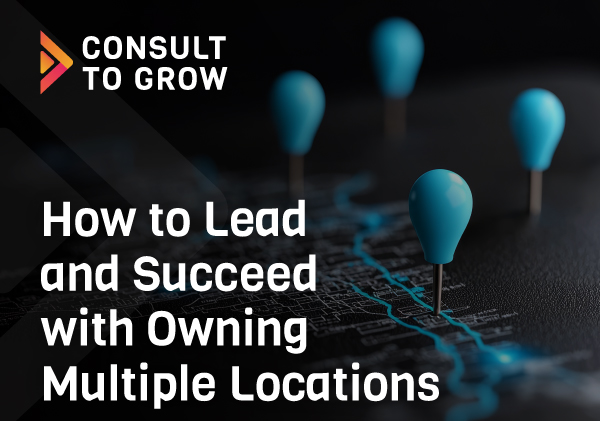
How to Lead and Succeed with Owning Multiple Locations
Owning multiple locations is often the most exciting milestone for a restaurant or retail owner, but it also comes with unique challenges. This post is
Is work really a relationship? How can we grow work relationships that make restaurants even better? How do restauranteurs improve their results while also enriching their teams’ lives? I’ve been on a mission to answer these questions ever since I attended a small retreat of people thought leaders who gather annually in Omaha to think deeply about topics that impact humans at work.
There is no doubt that there has never been a better time to think about how we improve the world at work between employers and employees, especially in the restaurant business. If you’re unsure of that importance, consider recent trends in staffing, turnover, and engagement– all on the rise. From an employee perspective, consider the challenges of lower morale, higher absenteeism, and more mental health issues – also, all on the rise.
The truth is that work really is a relationship. Our industry is an array of those relationships. And employers that encourage healthy relationships at work can nurture individual and organizational growth.
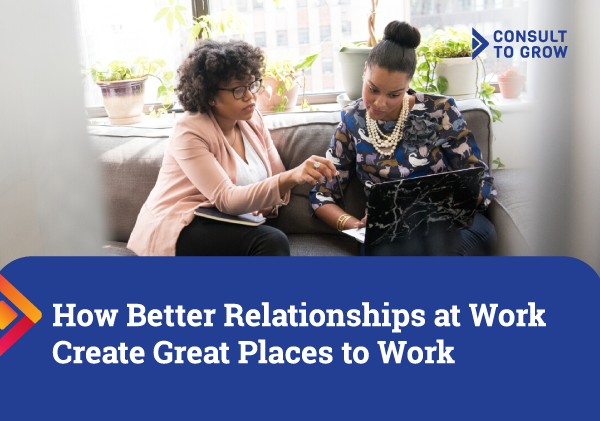
Yes, it really is! In his formative blog post, “Work is a Relationship, Not a Contract,” people thought leader Jason Lauritsen points out that employee sentiment data continually correlate feelings of being valued, trusted, cared for, developed and appreciated with employee engagement. And, it turns out, those all happen to be words that describe healthy relationships.
In a world where “quality time” is considered one of the five relationship love languages, the average American spends 7.8 hours at work (or 50% of their waking time), leaving about the same amount of time for household activities, caring for loved ones, supporting communities, and leisure (source: BLS’s 2021 American Time Use Survey). The math shifts when you consider the traditional restaurant owner expects managers to work a 50-hour work week, and the actual hours restaurant managers work might be higher.
Personal relationships have the profound ability to impact work relationships and vice versa. The moderators of our Omaha retreat asked a simple question… “What is your first memory of work?” Nearly everyone mentioned their caregivers’ relationship with work. Watching our caregivers’ relationship with work impacts how we see work and the world… “I watched my dad suffer to support us,” and “I watched work kill my mom” were two of the most visceral statements noted.
There is no magical boundary between home and the four walls of work. As someone who helps design the world of work at emerging restaurant groups, these ideas leave me feeling an immense responsibility to heal relationships through work. We have the potential to improve lives, businesses, and communities if we’re brave enough to improve the relationships at work and impacted by work.
In the restaurant industry, a successful business is built on strong relationships. Whether it’s the relationship between a chef and their ingredients, a server and their guests, a manager and their staff, or home office teams and their management teams — it all comes down to connection, communication and growth. For those relationships to thrive, trust and growth are key.
Chefs must trust that their suppliers provide them with the freshest, highest-quality ingredients. Servers must understand the needs and preferences of guests. Managers must build trust and understanding with their team to create high-quality meals and memorable experiences. Home office teams must support and grow their managers to enable them to thrive.
In the world of emerging restaurant groups, a popular mantra is “You’re either growing or going!” For many years, I’ve prompted high-potential individuals with the question: “Who owns your development?” to which they typically say, “my boss” or “HR.” And, with a smirk, I retort… “No, YOU own your development!” That’s partially true and partially untrue about growth.
It’s true that for an individual to achieve self-expansion, it’s important for them to learn new information, develop skills, and take on more challenges. But it’s also true that relationships are a key source of human growth. When “me” becomes “we,” a merger of identities, knowledge, perspectives and skills occurs that can create profound shifts for one or both parties.
The retreat in Omaha benefited from the attendance of Lue Kraltchev. Lue is a 20+ year hospitality veteran obsessed with studying cultures and what makes them flourish. She introduced us to the idea of an “Amp-or-Dim Scale.” The group took Lue’s idea and brainstormed some potential Amp-or-Dim assessing questions.
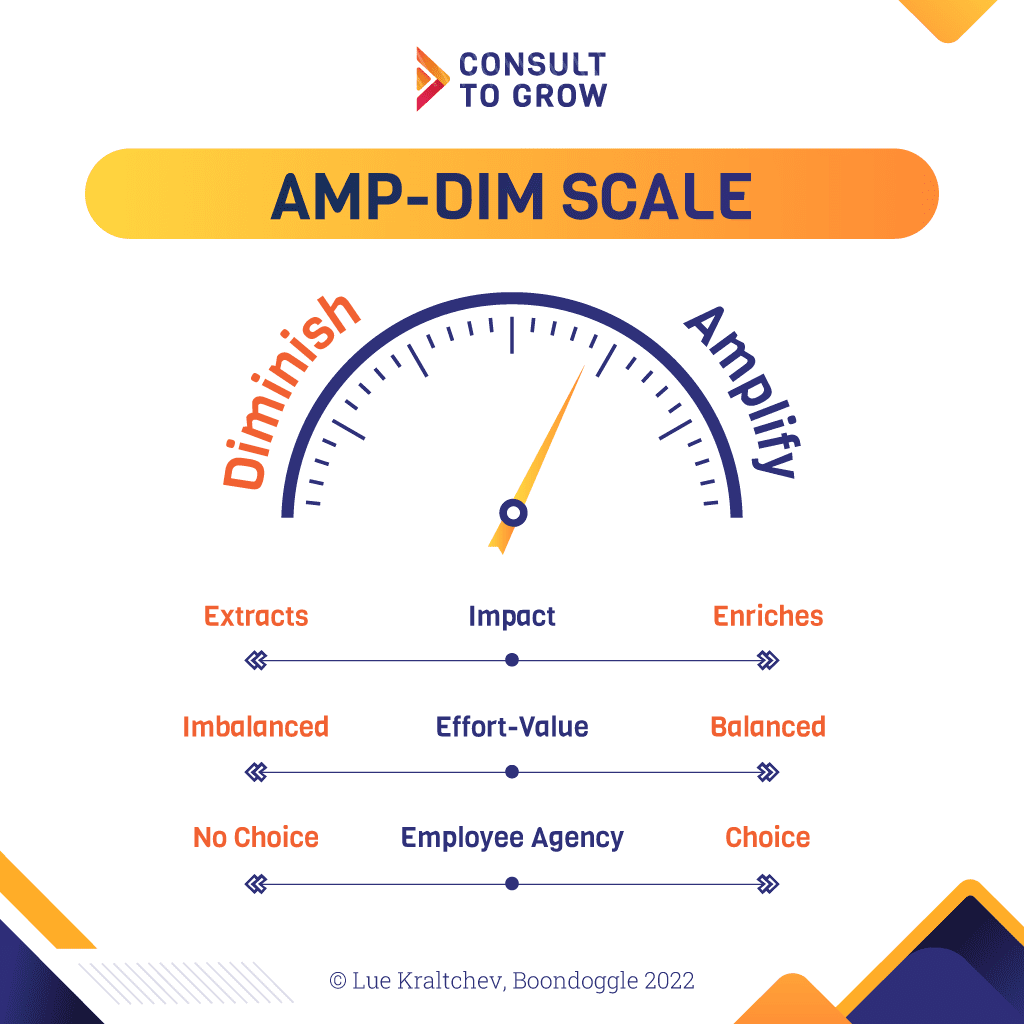
I truly believe those who amplify their employees, amplify their businesses. We have the opportunity and responsibility to amplify employee development, healthy at-work relationships, and lives beyond the four walls of work. If we do, we also fortify the future of our businesses.
It’s clear the world is changing, but it’s not clear that employers are shifting fast enough to keep pace, especially in the restaurant industry. Not sure? The Washington Post recently reported that nearly 2 million hospitality and leisure jobs remain unfilled because those workers have found better jobs. If shifts are happening – and the trends say they are –, then change is necessary to thrive.
Here are a few ideas for building a better future for our workforce, business, and industry:
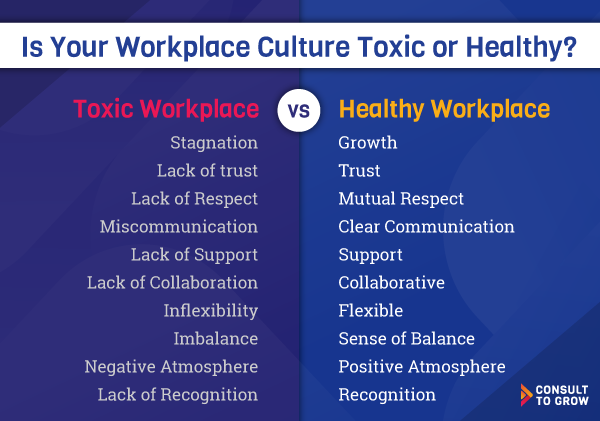
When I think about the companies I want to work with and invest in, I want them to be places that are growing, trusted, respectful, honest & forthright, supportive, collaborative, adaptive, and appreciative. I want them to be places that build healthy relationships with all stakeholders – not just shareholders. I want them to be places that amplify their team and the world… not diminish and extract.
If you take all of this to heart, I have no doubt you’ll be ready to make the world of work you influence even better. Those who don’t might just be “going” rather than “growing.” My greatest dream is for the restaurant industry to show the rest of the world at work the path forward. We transform the world if we redesign work intent on enriching relationships and amplifying employees. I’d love to hear your ideas in the comments below or my inbox.
Consult to Grow® provides various tools and services to help you develop people strategies to grow your team. We can expertly assess your HR infrastructure, develop custom Employer of Choice strategies, facilitate leadership meetings and retreats, help you design bonus and incentive programs, and design managing partner programs. Ready to get started?

Owning multiple locations is often the most exciting milestone for a restaurant or retail owner, but it also comes with unique challenges. This post is

Is the weight of leadership or ownership pressing down on you? Do you wake up each day drained, overwhelmed, and uninspired? Maybe you are struggling
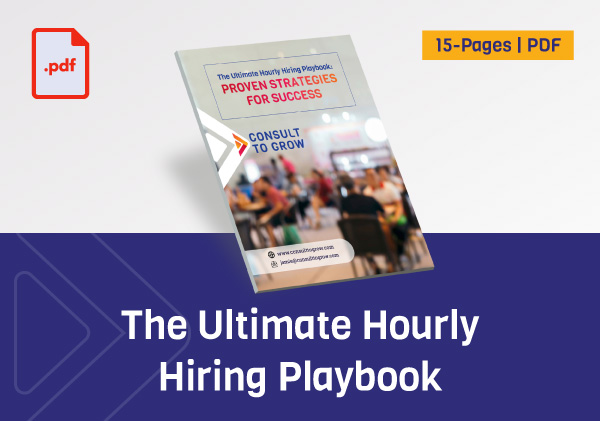
“The Ultimate Hourly Hiring Playbook” is designed for the dynamic demands of the service industry. This comprehensive guide is your essential resource for refining your